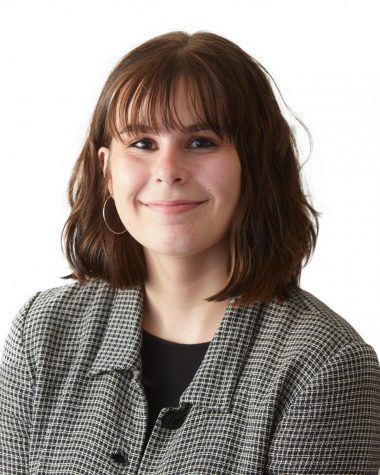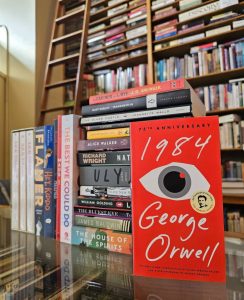UWL students talk sex
UWL sophomore Isabella Beach.
March 7, 2020
In the 2018 National College Health Assessment, 66 percent of college students had sex in the last 12 months. With the University of Wisconsin-La Crosse’s undergraduate class being 10,580 students, roughly 6,983 of these students have had sex this past year. We asked three UWL students to talk about sex, consent, sexual empowerment and pleasure.
Isabella Balma: Sophomore, majoring in women’s, gender and sexuality studies, double minor in biology and Spanish.
Balma described sex as being a source of pleasure between two or more individuals. “I think it is open to expressing different emotions and is a physical way to express attraction, love, depending on the interaction between two people,” said Balma.
She said that she feels comfortable discussing sex depending on who the person is.
“I personally feel comfortable talking about sex, it depends on who I am speaking with but in general, I have felt comfortable for a while talking about it and mostly because it is important for me to have these open conversations about sex because it is still considered to be taboo even though it is 2020,” said Balma. “I want to lead by example by being comfortable and open when speaking about sex.”
Balma felt like her sex education in K-12 was clinical and discussed everything that could go wrong with sex, rather than sex-positivity. Because of this, she had a self-taught journey of sexual empowerment by using resources such as pornography, erotica, “Cosmopolitan,” “Teen Vogue” and Planned Parenthood.
Balma said, “Sexual empowerment means that you are fully comfortable with your sexual preferences, your values, your identity, what you’re looking for out of sex and be able to communicate that with pride and have your own autonomy.”
Consent is both verbal and physical for Balma. She explained that it is saying yes, but also the physical observation of not shying, pulling or fighting away.
“It is the verbal yes, you don’t have to say yes to everything to be given consent but as soon as you say no or stop, the consent is gone. It is something that is super obvious, and if you think it’s not obvious, then you’re not looking for it,” said Balma. “A lot of people think asking for consent is awkward, but there are a lot of ways to facilitate that conversation that can still have that sexiness to it. You can ask ‘is this ok?’ it’s not that hard.”
Pleasure in sex is important for Balma, and she feels like for female-identifying bodies especially, pleasure has to be discussed.
“There were so many generations of women who did not have these conversations and then didn’t experience orgasms. It is so important to have conversations and not be afraid to talk about it because the more you talk about it, the easier it gets. The female orgasm is real and it exists and it’s not just for people with a penis,” said Balma. “You can have an orgasm, it is ok and you can do it yourself.”
Balma wants UWL students to know that talking about sex is normal and increasing your conversations around the topic helps normalize it.
“It’s okay to talk about it [sex] it’s important to talk about it. The more we talk about sex, porn, masturbation, consent, the more conversations we have, the easier it is to deal with a lot of the problems and the negative things that happen.”
Juliette Moushon: Senior, majoring in biology with a biomedical concentration and minoring in microbiology.
Juliette Moushon sees sex as a form of release and a way of connecting with someone else and feeling empowered. She said she did not always feel comfortable talking about sex until she got to college, and then when she became a resident assistant (RA) these conversations increased.
“As an RA, I have always felt comfortable talking about safe sex. It wasn’t until my second semester as an RA where I was talking more about sex as a positive thing as well as safe sex conversations. I would encourage residents to visit the pleasure store downtown, explore what they like, and use that as a form of meditation and me time,” said Moushon. “I have had a lot of first-year female students as residents and they have felt really submissive when it comes to sex and feel like they can’t say what they actually like.”
For her, sexual empowerment is about being comfortable with your own body.
“That is something I have always struggled with. Being able to say yes and no to partners is also something I have always struggled with,” said Moushon. “Such as explicitly saying no, and not expecting them to relay on my body language because I have noticed that is not an effective tool for me. Choosing when and what I want to do and bringing consent into the conversation is a big thing.”
Moushon added that body positivity in sexual empowerment is important for her because it increases her empowerment and makes her more self-aware.
“It makes me feel a lot more empowered to think about the way my body is built, what it can do for me. I tend to be what is known as curvier and I have always felt sexually objectified from that starting at a young age. Rewriting that narrative is important,” said Moushon.
She believes that asking for consent is not difficult, and gives suggestions such as saying, “is this ok?” “are you into this?” and “do you want to do something different?”
Moushon recently got a knife tattoo on her lower hip which she sees as an act of sexual empowerment. “It [the tattoo] was a huge act of sexual empowerment for me because I just got out of a long relationship where I felt like I lost a lot of my sexual empowerment and my sex drive which made me feel very not myself,” said Moushon.
She said that paying attention to your body is also important for her. “Sex and masturbation can be a really important therapeutic tool. It is okay to have sex, and it is okay to talk about it. It is also okay not to have sex. Sometimes that message gets lost on a college campus,” said Moushon.
Isabella Beach: Sophomore, majoring in public health and community health education and minoring in women’s, gender and sexuality studies.
Isabella Beach described sex as a combination of the biological side and also pleasure. She said she has “huge respect” for pleasure and a “passion” for encouraging pleasure of others.
Sexual empowerment for Beach is “knowing what you want and being able to ask for it and not feel guilty.” Beach said, “I think that a lot of people are so concerned about what sex is supposed to look like, and not what they want sex to be. I think sex can be anything, as long as it fits your definition and your comfort zone and it’s consensual.”
Beach explained that there are a lot of ways to get consent from a sexual partner.
“It’s always important to get consent, but there are so many ways to say it. I think that is one of the messages that is missing in consent education, people feel strange learning and asking about consent, but they don’t realize that they have been learning and asking for consent their whole lives, but just in other ways,” said Beach. “It is a versatile conversation that can be head and is important in all aspects of life, not just sex.”
For pleasure, Beach understands it as being fulfilled, but also a mutual or singular agreement.
“It has to go both ways, if you are able to obtain pleasure from another person or from yourself or an object or a thought, it is almost my version of nirvana,” said Beach. “It’s important that if you want to feel pleasure physically that you have the toolset to do so.”
Beach wants UWL students to know that talking about sex without it being a joke is ok.
“So many people are so used to joking when talking about it [sex] because they are uncomfortable and maybe a little fearful. I want other students to know that we should not feel offended or weirded out if someone wants to talk about sex with you,” said Beach. “Obviously ask first, but it is not a cliché to want to talk about sex. We all have sex, that’s life.”
Beach runs an Instagram account called “issyonthepill” where she talks about sex, pleasure, consent, contraception and other sex topics. She started it in high school and has seen the difference that it made for her peers.
“I am from a really small town where talking about sex was even more taboo and restrictive. I started the account with the goal that even if I can make one person more comfortable then I will feel successful,” said Beach. “There were so many girls younger than me and male-identifying people in my hometown who would message me or share the account because something they read on it saved them from making a mistake or having an unplanned pregnancy or getting into an unhealthy relationship. It is really important to learn from each other.”







